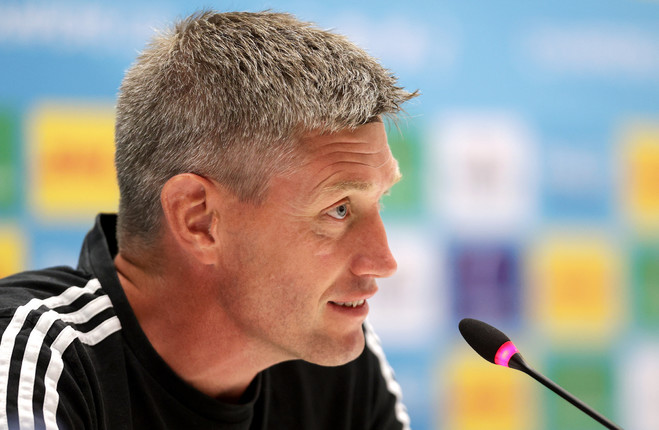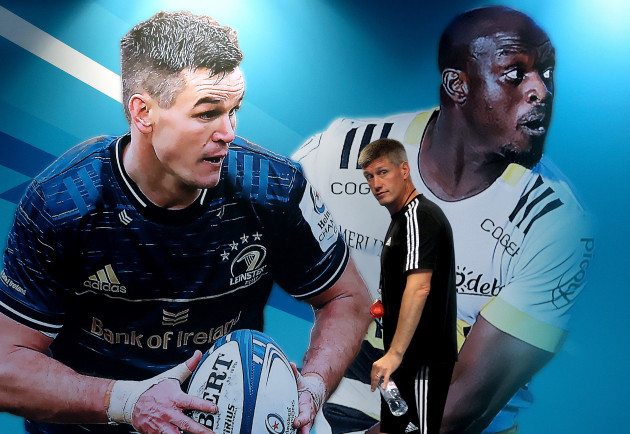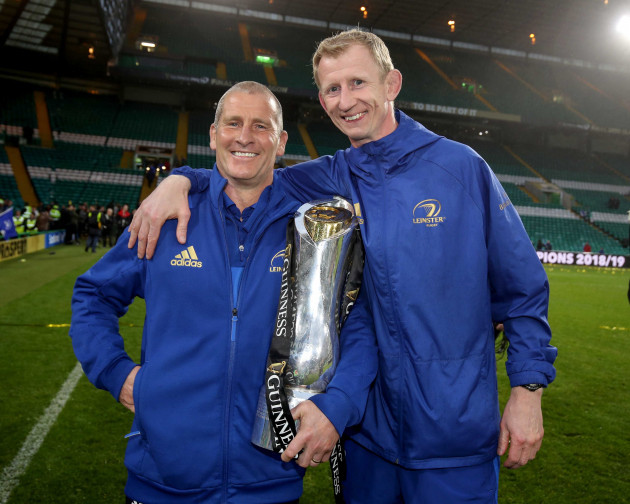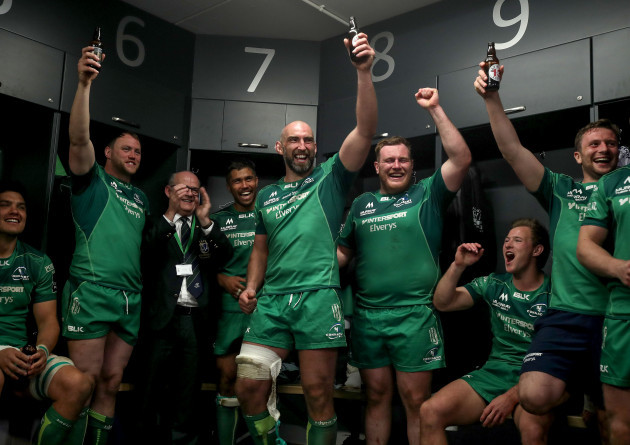THROUGHOUT THE WEEK, the build-up to today’s Champions Cup final has focused on Will Skelton’s calf, Tadhg Furlong’s ankle, the strength of La Rochelle’s scrum, the Rog and Johnny reunion.
Here is another way of looking at it. In this, the 27th edition of the European Cup, the respective head coaches of the two finalists are Irish, something that has happened just once before.
We all know why there has been a shortage. In Ireland, there has been a culture of looking outwards rather than inwards for inspiration, Leo Cullen, the incumbent, being just the third Irish coach Leinster have had in the professional era.
Out west, Connacht have appointed a Samoan, a New Zealander and an Australian since a local last held their head coaching position while only one of the last five Munster coaches has been from the province.
The Ulster story is a similar one, with Brian McLaughlin and Neil Doak’s tenures sandwiched by the eras of Matt Williams, Mark Anscombe, Les Kiss, Jono Gibbes and Dan McFarland.
That’s why we need to be sitting up and taking notice of what Cullen and Ronan O’Gara have achieved this season. By taking a team to a Champions Cup final, they have achieved something only four Irish coaches, Harry Williams, McLaughlin, Declan Kidney and Mark McCall, have managed.
Each story is worth a book never mind a chapter, O’Gara’s being fascinating because of the boldness of his choices, shifting a family of five firstly across to Paris, then for two years to Christchurch, most recently to La Rochelle, refusing to stay in his comfort zone.
Remember he had the offer of an extra year at Munster when he opted instead to retire from playing in 2013, persuading the Racing owner, Jacky Lorenzetti, that he was the man to replace Gonzalo Quesada, the club’s outgoing kicking coach.
Given who he was primarily going to be working with – old rival, Johnny Sexton – there was a certain amount of nerve behind O’Gara’s call. Yet he made it, swiftly assuming greater responsibilities as skills and defence coach at the club, before he was off again, this time to the Crusaders.
That was his finishing school, not just in terms of seeing how head coach, Scott Robertson, managed people, but also by gaining exposure to the highest level of club rugby, a point he made in a 2019 interview with The Sunday Times.
“It is a sink-or-swim environment so it really gives you confidence to know that you can make a difference,” he said. “I made some really good friendships and connections. They completely reshaped you, made you understand yourself first as a person and then as a teacher, then as a coach, then connecting with players.”
The Crusaders culture was radically different to what he was accustomed to at Munster, a team that thrived on being the underdog. In Christchurch, it was the opposite: they expected to win. “The dynamic there was incredibly positive, everything from senior players to academy, very connected. There is huge detail in their game but the connection between players comes before the strategy side of it.
“I’m completely of a growth mindset as a result. To succeed, you always need to be evolving, you need to be building expertise and collaborating and discussing ideas and then you need to connect with your players. When you get people of similar mindset in a room, you don’t know your limit.”
What he did know was that there were no limits to where he could go at La Rochelle. Racing wanted him back but only in a supporting role. In contrast, Jono Gibbes was prepared to share much of his power in the Stade Marcel-Deflandre. So, O’Gara swapped New Zealand’s south island for France’s Atlantic coast, fully aware of the potential pitfalls. “If you get your team relegated here (from the Top 14) the whole town hates you.”
He need not have worried. He and Gibbes helped La Rochelle to two finals last year. Clermont took note, persuading Gibbes to relocate there which freed up O’Gara to assume overall control in the south-western club. Now look where he is, in a European final in his first season as a Number One.
It’s an impressive achievement and requires context. No Irish coach had ever done that. In fact the only other coach connected to an Irish province to have reached a European Cup in his first season is a guy called Joe Schmidt. O’Gara is in good company.
So is Cullen. There is a tendency to only ever mention the Leinster coach’s name in conjunction with Stuart Lancaster’s, the highly skilled former England coach whose excellence on the training field is respected worldwide.
Cullen, in contrast, is undervalued.
You can see why. Leinster’s style is easy on the eye and is a Lancaster blueprint. Mondays and Tuesdays are his key days, the afternoons when he rotates three sets of Leinster XVs, utilising the electric scoreboard at the club’s training ground to guide the team through match-day scenarios.
“Often he’d put 78.30 on the scoreboard and tell one team they have a lead to defend, the other they’ve 90 seconds to score a try to win the game,” said a Leinster insider. Creating chaos is his catchphrase, Lancaster frequently instructing the 30 players to immediately relocate to the far end of the pitch, where a ball is thrown into a corner. “Play from there,” he hollers.
It works, not just in honing their fitness, their defensive and attacking skills, but in also providing an environment that a squad of 60 can draw satisfaction from.
Still, it’s Cullen who had to deliver the bad news to the 37 who didn’t make today’s match-day squad, who refuses to court favouritism by taking easy or popular decisions. “Leo’s ability to keep everyone happy is a remarkable trait,” said Leinster’s chief executive, Mick Dawson.
It’s an underrated skill, mastered by an underrated coach. You can’t help feel he was damaged by the horrendous start to his coaching career, when he lost his opening four European games, the one to Wasps being a record home defeat in Europe.
We tend to forget what he did next, handing five debutants in a round five game against a Bath team who were chasing a quarter-final spot. Leinster won that day and the five have proven a long-term success, three of them named in today’s match-day squad.
He has stuck to that promote-from-within policy, handing European debuts to 12 of the 15 who start in Marseille, while stubbornly benching them for many URC matches, just one of Leinster’s starting side, Ross Molony, featuring in more than eight league games this year.
That’s where the harmony in the Leinster dressing room comes from, that willingness to share the workload. Players know where they stand. “You might not have liked what he had to say when he left you out,” recalled Barry Daly in an interview with The42 last year, “but you couldn’t argue with it. It’s fair, it’s honest.”
And it works. A club’s culture is often defined by their performances when the internationals are away and the cameras shining in some place else. So, in Leinster’s double winning season, 2017/18, there seemed little to grumble about. But Cullen was irked by a home defeat to Treviso and a 37-point hammering away to Connacht late in that campaign.
That was when the brotherhood chat began. The memo went out to the squad, either we build a legacy together or we erode our culture from within. Lesser games like Zebre, Dragons started to matter more because, in Cullen’s words, ‘losing sucks. It sucks. You hear them (the opposition) cheer, you see what it means to them and you’ve just got to live with that. You don’t want that feeling’.
They rarely get it. Since that double winning season, Leinster have lost just 16 of the 102 games they have played. The last thing they want is for that figure to change to 17 out of 103 in Marseille but even if it does, the broader picture needs to be looked at.
For too long Irish rugby has shopped abroad for coaches and you wonder if that policy stems from an insecurity, whether recruiters get blown away by the colour of a passport as much as the ink on their CV.
Often those overseas appointments have worked out just fine to the extent that you couldn’t imagine where Irish rugby would be had Dawson not picked up the phone and asked Schmidt to fly across for a chat way back in 2010.
But you need a mix. You need the decades of wisdom that local knowledge brings as well as the fresh ideas that moves across borders. In O’Gara you get both; with Cullen you get a coach with a champion’s mentality and a humility to know his limitations.
Nine years after an Irishman last coached the national team, two outstanding candidates have emerged as potential successors to Andy Farrell. That’s a good enough reason for Kevin Potts, the IRFU’s chief executive, and David Nucifora, the union’s high performance guru, to tune in today.
Get instant updates on your province on The42 app. With Laya Healthcare, official health and wellbeing partner to Leinster, Munster and Connacht Rugby.




